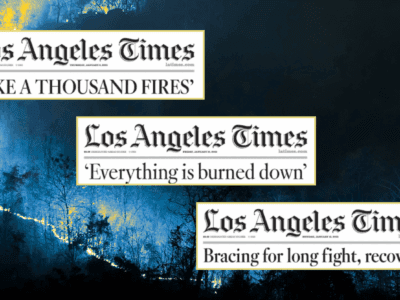The Greening of Tisha B’Av

Three days ago, I fasted on the Jewish holy day of Tisha B’Av, which marks and commemorates the destruction of the First and Second Temples in Jerusalem. Jews observe the day also by reading Eikha, the biblical Book of Lamentations. No fast day could be considered pleasant, but it has always been a particularly meaningful day for me, not the least because it runs so counter to Americans’ concept of history: as the great historian Richard Hofstadter incisively observed, Americans treat our history as “an excuse for an orgy of self-congratulation.” I’ve even spilled some ink on it in the past.
But I never thought of Tisha B’Av as having environmental implications until I read Rabbi David Seidenberg’s intriguing take on it:
The idea that tragedy and disaster are punishment for our sins–what theologians call “theodicy”—is alien to most modern Jews…Besides the obvious consolation people received from believing that the tragedy had meaning, we might also consider that for the ancients, the two choices were to believe that the destruction was punishment, or that God simply had no concern for them. It is easy to imagine why people would choose the image of a punishing God over the complete absence of God…
According to Jeremiah, the reason for exile was that Israel had not allowed the land to rest during her Jubilee years – an outcome promised in the Torah…In an age when we have good reason to believe that our ecological “sins” are coming home to roost, the connection between disaster and divine retribution may not seem so farfetched. If we sympathize with this idea, we can read Eikhah as an invitation to change our lives, towards justice for all peoples, for all species, and for the land herself.
Seidenberg’s interpretation is a bit of a push. It was more than just not letting the land rest; the relevant passages in Jeremiah and Chronicles emphasize the refusal of Israel to free their Hebrew slaves.
But as interpretations go, it’s far, far better than most of what passes for religion nowadays. Consider the example of Mac Hammond, the Minneapolis megachurch pastor who preaches the so-called “prosperity gospel.” Hammond tells his flock that “you can never have too much money.” Hammond himself has “earned” millions from his church, owns four homes, a Porsche, a Lexus, and a private jet. Like most Christian conservatives, Hammond claims to be a Biblical literalist: those stories about the camel going through the eye of the needle and caring for “the least of these” somehow must not have made it into his edition.
So now that Tisha B’Av is over, and Jews move, over the next 60 days, into Rosh Hashana and Yom Kippur, we might consider how we are creating our own divine retribution and atoning for our sins against the earth.







Reader Comments